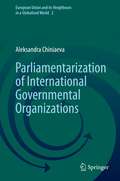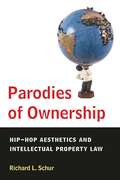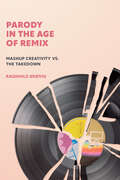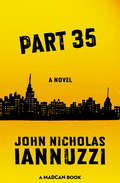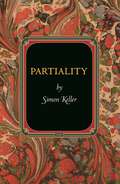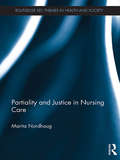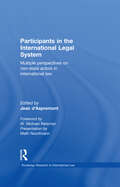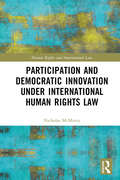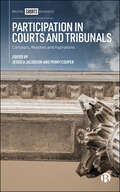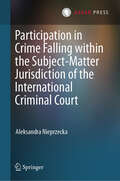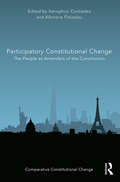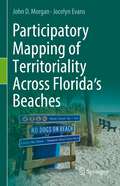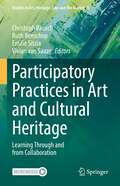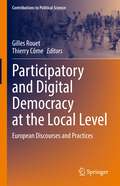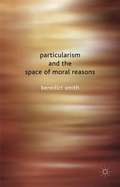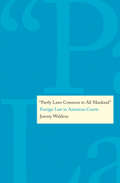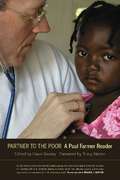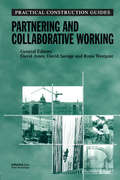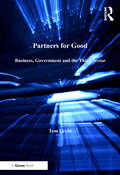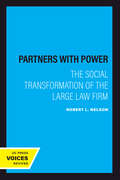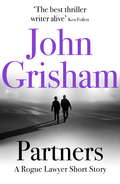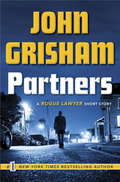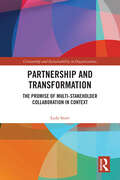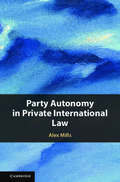- Table View
- List View
Parliamentarization of International Governmental Organizations (European Union and its Neighbours in a Globalized World #2)
by Aleksandra ChiniaevaThis book offers a general framework for a better understanding of the differences and similarities between the institutional rules of intergovernmental organizations that include parliamentary elements, and analyzes the role of various types of international parliamentary assemblies in the system of global governance, as well as insights into the process known as “parliamentarization of international organizations.” Firstly, it presents a case study of various types of international parliamentary assemblies, which is then used to analyze the law of particular international organizations that include parliamentary assemblies or relate to them. Secondly, the book compares two parliamentary assemblies of international organizations – the Parliamentary Assembly of the Organization for Security and Co-operation in Europe (OSCE PA) and the Parliamentary Assembly of the Council of Europe (PACE) – in terms of structure, powers, and relations with their IGOs. It also investigates the activities of assemblies and their cooperations for the purpose to explore the positive effects of the work of international parliamentary assemblies and their potential for having an impact at the national level. Lastly, the book analyzes the tangible and desirable powers of international assemblies by comparing examples of existing international parliamentary assemblies with the UN Parliamentary Assembly project. Based on that, the author compiles a list of essential requirements and principles for effective international parliamentary assemblies.
Parliamentary Bills of Rights
by Janet L. Hiebert James B. KellyBoth New Zealand and the United Kingdom challenge assumptions about how a bill of rights functions. Their parliamentary bills of rights constrain judicial review and also look to parliament to play a rights-protecting role. This arises from the requirement to inform parliament if legislative bills are not compatible with rights. But are these bills of rights operating in this proactive manner? Are governments encountering significantly stronger pressures to ensure legislation complies with rights? Are these bills of rights resulting in more reasoned deliberations in parliament about the justification of legislation from a rights perspective? Through extensive interviews with public officials and analysis of parliamentary debates where questions of compliance with rights arise (prisoner voting, parole and sentencing policy, counter-terrorism legislation, and same-sex marriage), this book argues that a serious gap exists between the promise of these bills of rights and the institutional variables that influence how these parliaments function.
Parodies of Ownership: Hip-Hop Aesthetics and Intellectual Property Law
by Richard L. SchurWhat is the relationship between hip-hop and African American culture in the post--Civil Rights era? Does hip-hop share a criticism of American culture or stand as an isolated and unique phenomenon? How have African American texts responded to the increasing role intellectual property law plays in regulating images, sounds, words, and logos? Parodies of Ownership examines how contemporary African American writers, artists, and musicians have developed an artistic form that Schur terms "hip-hop aesthetics." This book offers an in-depth examination of a wide range of contemporary African American painters and writers, including Anna Deavere Smith, Toni Morrison, Adrian Piper, Colson Whitehead, Michael Ray Charles, Alice Randall, and Fred Wilson. Their absence from conversations about African American culture has caused a misunderstanding about the nature of contemporary cultural issues and resulted in neglect of their innovative responses to the post--Civil Rights era. By considering their work as a cross-disciplinary and specifically African American cultural movement, Schur shows how a new paradigm for artistic creation has developed. Parodies of Ownership offers a broad analysis of post--Civil Rights era culture and provides the necessary context for understanding contemporary debates within American studies, African American studies, intellectual property law, African American literature, art history, and hip-hop studies. Weaving together law, literature, art, and music, Schur deftly clarifies the conceptual issues that unify contemporary African American culture, empowering this generation of artists, writers, and musicians to criticize how racism continues to affect our country.
Parody in the Age of Remix: Mashup Creativity vs. the Takedown
by Ragnhild BrøvigThe art of mashup music, its roots in parody, and its social and legal implications.Parody needn&’t recognize copyright—but does an algorithm recognize parody? The ever-increasing popularity of remix culture and mashup music, where parody is invariably at play, presents a conundrum for internet platforms, with their extensive automatic, algorithmic policing of content. Taking a wide-ranging look at mashup music—the creative and technical considerations that go into making it; the experience of play, humor, enlightenment, and beauty it affords; and the social and legal issues it presents—Parody in the Age of Remix offers a pointed critique of how society balances the act of regulating art with the act of preserving it.In several jurisdictions, national and international, parody is exempted from copyright laws. Ragnhild Brøvig contends that mashups should be understood as a form of parody, and thus be protected from removal from hosting platforms. Nonetheless, current copyright-related content-moderation regimes, relying on algorithmic detection and automated decision making, frequently eliminate what might otherwise be deemed gray-area content—to the detriment of human listeners and, especially, artists. Given the inaccuracy of takedowns, Parody in the Age of Remix makes a persuasive argument in favor of greater protection for remix creativity in the future—but it also suggests that the content-moderation challenges facing mashup producers and other remixers are symptomatic of larger societal issues.
Part 35: A Novel
by John Nicholas IannuzziSandro Luca is a crusading young attorney with a family past that links him with the mob. Now the state wants him to defend two junkies who probably killed a cop. They're as good as convicted already. The papers have seen to that. If Sandro is going to save them, he's got to produce evidence that nobody thinks is there. And he's got to be the best, toughest lawyer New York has ever seen.
Partiality (Princeton Monographs in Philosophy #40)
by Simon KellerWe are partial to people with whom we share special relationships--if someone is your child, parent, or friend, you wouldn't treat them as you would a stranger. But is partiality justified, and if so, why? Partiality presents a theory of the reasons supporting special treatment within special relationships and explores the vexing problem of how we might reconcile the moral value of these relationships with competing claims of impartial morality. Simon Keller explains that in order to understand why we give special treatment to our family and friends, we need to understand how people come to matter in their own rights. Keller first presents two main accounts of partiality: the projects view, on which reasons of partiality arise from the place that people take within our lives and our commitments, and the relationships view, on which relationships themselves contain fundamental value or reason-giving force. Keller then argues that neither view is satisfactory because neither captures the experience of acting well within special relationships. Instead, Keller defends the individuals view, on which reasons of partiality arise from the value of the individuals with whom our relationships are shared. He defends this view by saying that we must accept that two people, whether friend or stranger, can have the same value, even as their value makes different demands upon people with whom they share different relationships. Keller explores the implications of this claim within a wider understanding of morality and our relationships with groups, institutions, and countries.
Partiality and Justice in Nursing Care (Routledge Key Themes in Health and Society)
by Marita NordhaugPartiality and Justice in Nursing Care examines the conflicting normative claims of partiality and impartiality in nursing care, looking in depth at how to reconcile reasonable concerns for one particular patient with equally important concerns for the maximisation of health-related welfare for all with relevant nursing-care needs, in a resource-limited setting. Drawing on moral philosophy, this book explores how discussions of partiality and impartiality in moral philosophy can have relevance to the professional context of clinical nursing care as well as in nursing ethics in general. It develops a framework for normative nursing ethics that incorporates a notion of permissible partiality, and specifies which concerns an ethics of nursing care should entail when balancing partialist and impartialist concerns. At the same time, Nordhaug argues that this partiality must also be constrained by both principled and context-sensitive assessments of patients’ needs, as well as of the role-relative deontological restriction of minimising harm, something that could be mitigated by institutional and organisational arrangements. This thought-provoking volume is an important contribution to nursing ethics and philosophy.
Participants in the International Legal System: Multiple Perspectives on Non-State Actors in International Law (Routledge Research in International Law)
by Jean D'AspremontThe international legal system has weathered sweeping changes over the last decade as new participants have emerged. International law-making and law-enforcement processes have become increasingly multi-layered with unprecedented numbers of non-State actors, including individuals, insurgents, multinational corporations and even terrorist groups, being involved. This growth in the importance of non-State actors at the law-making and law-enforcement levels has generated a lot of new scholarly studies on the topic. However, while it remains uncontested that non-State actors are now playing an important role on the international plane, albeit in very different ways, international legal scholarship has remained riddled by controversy regarding the status of these new actors in international law. This collection features contributions by renowned scholars, each of whom focuses on a particular theory or tradition of international law, a region, an institutional regime or a particular subject-matter, and considers how that perspective impacts on our understanding of the role and status of non-State actors. The book takes a critical approach as it seeks to gauge the extent to which each conception and understanding of international law is instrumental in the perception of non-State actors. In doing so the volume provides a wide panorama of all the contemporary legal issues arising in connection with the growing role of non-state actors in international-law making and international law-enforcement processes.
Participation and Democratic Innovation under International Human Rights Law (Human Rights and International Law)
by Nicholas McMurryThis book explores the human rights principle of participation and the human right to participation. The work presents an argument that international human rights law imposes obligations to enable participation, and demonstrates that it has been interpreted in this way by authoritative bodies. Divided into four parts, Part I provides the historical and theoretical background. Part II presents the argument that a right to participation and a human rights principle of participation exist in international law and Part III argues that human rights law, and the way it has been interpreted, can provide a coherent account of the content of such a right and principle. The conclusions of the book and their implications are explored in Part IV. While there have been several studies of specific forms of participation, such as collective bargaining, this study provides a coherent account of the meaning and application of participation in international human rights law as a whole. The book will be an invaluable resource for academics, researchers, and policy-makers working in the area of international human rights law.
Participation in Courts and Tribunals: Concepts, Realities and Aspirations
by Jessica Jacobson and Penny CooperAvailable Open Access under CC-BY-NC licence Effective participation in court and tribunal hearings is regarded as essential to justice, yet many barriers limit the capacity of defendants, parties and witnesses to participate. Featuring policy analysis, courtroom observations and practitioners’ voices, this significant study reveals how participation is supported in the courts and tribunals of England and Wales. Including reflections on changes to the justice system as a result of the COVID-19 pandemic, it also details the socio-structural, environmental, procedural, cultural and personal factors which constrain participation. This is an invaluable resource that makes a compelling case for a principled, explicit commitment to supporting participation across the justice system of England and Wales and beyond.
Participation in Crime Falling within the Subject-Matter Jurisdiction of the International Criminal Court
by Aleksandra NieprzeckaThis book centres on the forms of participation in crime set out in the Rome Statute, but it is definitely not a simple repetition or summary of the views expressed in the ICC case law. Instead, the work critically elaborates on the ICC practice and presents a theoretical and dogmatic description of modes of criminal responsibility that might be found in the Statute. The element of novelty is however brought about by the methodology, which encompasses a normative analysis based on the distinction between the categories of sanctioned and sanctioning norms initially introduced by K. Binding in the German doctrine, but for the purposes of this book adjusted to the structure of international core crimes and reconciling them with the grounds for criminal responsibility as such. Moreover, the work does not avoid bold assertions concerning the norms of participation in crime concerning inter alia the concept of spectator or public approval and/or direct incitement to genocide.This approach should be of particular interest to those who are under the impression that international criminal law is entangled in a multiplicity of labels and the judicial practice sometimes adopts the same requirements without any further thought or analysis. The book aims to trigger a broader debate on the merits and rationale of participation in crime and encourages readers to rethink some of the concepts developed within judicial practice. The work also takes into consideration the ICC case law, in particular some tendencies that might be inferred from the separate and concurring opinions in the Ntaganda case.All in all, it endeavours to reflect on the content of Article 25 (3) and 28 of the Rome Statute and provide an answer on how ICC practice might and perhaps should evolve further.Aleksandra Nieprzecka, Ph.D. is a member of the Polish Bar Association in Kraków and worked as a principal researcher in the project concerningthe model of participation in crime adopted in the Rome Statute carried out at the Jagiellonian University in Kraków where she finished her doctoral studies according to the co-tutelle agreement between the Jagiellonian University in Kraków and the University of Hamburg.
Participatory Constitutional Change: The People as Amenders of the Constitution (Comparative Constitutional Change)
by Xenophon Contiades Alkmene FotiadouThis book explores the recent trend of enhancing the role of the people in constitutional change. It traces the reasons underlying this tendency, the new ways in which it takes form, the possibilities of success and failure of such ventures as well as the risks and benefits it carries. To do so, it examines the theoretical aspects of public participation in constitutional decision-making, offers an analysis of the benefits gained and the problems encountered in countries with long-standing experience in the practice of constitutional referendums, discusses the recent innovative constitution-making processes employed in Iceland and Ireland in the post financial crisis context and probes the use of public participation in the EU context. New modes of deliberation are juxtaposed to traditional direct-democratic processes, while the reasons behind this re-emergence of public involvement narratives are discussed from the aspect of comparative constitutional design. The synthetic chapter offers an overview of the emerging normative and comparative issues and provides a holistic approach of the role of the people in constitutional change in an attempt to answer when, where and how this role may be successfully enhanced. The work consists of material specifically written for this volume, and authored by prominent constitutional scholars and experts in public participation and deliberative processes.
Participatory Mapping of Territoriality Across Florida’s Beaches
by John D. Morgan Jocelyn EvansThis book offers a theoretical and practical exploration of the beach as space and places unique disciplinary lenses (Political Science and Geography). If we accept that what one possesses, one has a claim to, becoming property, then how that possession is enforced, socially, makes all the difference in defining what constitutes territoriality. Morgan and his colleagues have carried out various studies and applied various methods to study the developing coast of Florida. From these efforts, we compare the different regions of the State (e.g., Florida panhandle vs. South Florida) in terms of local beach culture and economics to unpack the topic of tension between beach property and access using firsthand accounts in many cases. This book approaches the complex topic of territoriality on Florida’s beaches from multiple perspectives but related methods involving time geography, a public space index, participatory mapping/cartography, and transboundary viewsheds. This analysis illustrates the fruitfulness of conceptualizations of property that are complex, multiplicative, and evolving. It calls for a recognition of human rights to the commons -- both now and in the future. And it highlights the constructed nature of public space - as a space that provides meaning through bodily performance and encounter. Approaches the complex topic of territoriality on Florida’s beaches from methods of participatory mapping/cartography and performance art.Offers a theoretical and practical exploration of the beach as space and place.Utilizes the lens of territoriality and field-based participant cartographic mapping to understand better how the developed shoreline is territorialized.
Participatory Practices in Art and Cultural Heritage: Learning Through and from Collaboration (Studies in Art, Heritage, Law and the Market #5)
by Christoph Rausch Ruth Benschop Emilie Sitzia Vivian Van SaazeThis edited volume analyzes participatory practices in art and cultural heritage in order to determine what can be learned through and from collaboration across disciplinary borders. Following recent developments in museology, museum policies and practices have tended to prioritize community engagement over a traditional focus on collecting and preserving museal objects. At many museal institutions, a shift from a focus on objects to a focus on audiences has taken place. Artistic practices in the visual arts, music, and theater are also increasingly taking on participatory forms. The world of cultural heritage has seen an upsurge in participatory governance models favoring the expertise of local communities over that of trained professionals. While museal institutions, artists, and policy makers consider participation as a tool for implementing diversity policy, a solution to social disjunction, and a form of cultural activism, such participation has also sparked a debate on definitions, and on issues concerning the distribution of authority, power, expertise, agency, and representation. While new forms of audience and community engagement and corresponding models for “co-creation” are flourishing, fundamental but paralyzing critique abounds and the formulation of ethical frameworks and practical guidelines, not to mention theoretical reflection and critical assessment of practices, are lagging.This book offers a space for critically reflecting on participatory practices with the aim of asking and answering the question: How can we learn to better participate? To do so, it focuses on the emergence of new norms and forms of collaboration as participation, and on actual lessons learned from participatory practices. If collaboration is the interdependent formulation of problems and entails the common definition of a shared problem space, how can we best learn to collaborate across disciplinary borders and what exactly can be learned from such collaboration?
Participatory and Digital Democracy at the Local Level: European Discourses and Practices (Contributions to Political Science)
by Gilles Rouet Thierry CômeThis edited volume discusses digital democracy at the local level in Europe. Contrasting the political discourse surrounding participatory digital democracy with actual experiences of implementation, the book provides a wholistic view of digital democracy across Western, Central, and Eastern Europe. The book is divided into three parts. Chapters in Part I analyze discourses about participatory democracy in Europe. Chapters in Part II provide case studies of digital democracy practices at the local level in the EU. Chapters in Part III discuss the risks and challenges associated with digital democracy. Written by a panel of international, interdisciplinary experts, this volume will be of interest to researchers, students, and practitioners across public administration, political science, economics, management, and sociology.
Particularism and the Space of Moral Reasons
by Benedict SmithParticularism and the Space of Moral Reasons critically assesses the startling idea that our moral reasoning does not need to use moral principles. If we don't have principles, how do we work out what to do? This book examines 'moral particularism', a controversial idea at the forefront of contemporary moral theory.
Partly Laws Common to All Mankind
by Jeremy WaldronShould judges in United States courts be permitted to cite foreign laws in their rulings? In this book Jeremy Waldron explores some ideas in jurisprudence and legal theory that could underlie the Supreme Court’s occasional recourse to foreign law, especially in constitutional cases. He argues that every society is governed not only by its own laws but partly also by laws common to all mankind (ius gentium). But he takes the unique step of arguing that this common law is not natural law but a grounded consensus among all nations. The idea of such a consensus will become increasingly important in jurisprudence and public affairs as the world becomes more globalized.
Partner to the Poor: A Paul Farmer Reader
by Haun Saussy Paul FarmerThis book illuminates the depth and impact of anthropologist and physician Paul Farmer's contributions and demonstrates how, over time, this unassuming and dedicated doctor has fundamentally changed the way we think about health, international aid, and social justice.
Partnering and Collaborative Working (Practical Construction Guides)
by David JonesPartnering and Collaborative Working: Legal and Industry Practice brings together leading construction industry and legal experts to discuss key elements of the partnering process and how they can be implemented.
Partners for Good: Business, Government and the Third Sector
by Tom LevittAfter a century in which charities suspected the motives of cynical business people, and business people dismissed the contributions of amateur volunteers, the two sectors are coming together today as never before. The third sector has increased its business capacity through the experience gained from a decade of providing commissioned services to the public sector. Society today expects employers to do more to engage with both communities and good causes and the business case for doing so can be and is being made. But business also realises that charities do conscience better than they can and so co-working is increasingly being sought. In Partners for Good, Tom Levitt points the way to successful partnerships at local, national and international levels. There is now even an agreed international standard on what constitutes the social responsibility obligations of organisations operating in all sectors, in all parts of the world, over and above international legal frameworks. Sustainability today refers to the triple bottom line (financial, social, environmental) rather than being a green concept alone. On the down side, grants and other funding opportunities provided by governments to the third sector over the last ten years are suddenly ending and support structures are disappearing. The incentives for forging successful and sustainable win:win partnerships between businesses and charities in the new Big Society are therefore high, however demanding the time scale on offer.
Partners with Power: The Social Transformation of the Large Law Firm
by Robert L. NelsonThis title is part of UC Press's Voices Revived program, which commemorates University of California Press’s mission to seek out and cultivate the brightest minds and give them voice, reach, and impact. Drawing on a backlist dating to 1893, Voices Revived makes high-quality, peer-reviewed scholarship accessible once again using print-on-demand technology. This title was originally published in 1988.
Partners: A Rogue Lawyer Short Story
by John GrishamDiscover how Rogue Lawyer's Sebastian Rudd meets his partner and bodyguard in this thrilling short story, by master of the legal thriller John Grisham.Ten years out of law school, and running an office out of what used to be a seedy bar, Sebastian Rudd is beginning to make a name for himself - and learning that in order to get justice, you often have to cheat.When he chooses to represent Thomas Cardell, he's about to make even more enemies. At 33 years old, and with no money and a son to care for, Thomas Cardell is forced to become a drugs mule. But on his first night in the game, he's ruthlessly shot at by an undercover cop, and his only choice is to shoot back in self-defence. When the cop is killed it's Cardell's word against the other police officer on the scene, and proving Cardell innocent will be far from simple. But who ever said getting justice was easy?Featuring the characters from ROGUE LAWYER, and full of the wit and fast-paced action that makes ROGUE LAWYER so irresistibly entertaining, PARTNERS is another classic Grisham story. 350+ million copies, 45 languages, 9 blockbuster films:NO ONE WRITES DRAMA LIKE JOHN GRISHAM
Partners: A Rogue Lawyer Short Story
by John GrishamAN ORIGINAL E-SHORT • This standalone prequel to the #1 bestseller Rogue Lawyer tells the story of how Sebastian Rudd finally found someone he could trust to be his driver, bodyguard, law clerk, and partner. Sebastian Rudd, rogue lawyer, defends people other lawyers won't go near. It's controversial and dangerous work, which is why Sebastian needs his bodyguard/assistant/sidekick: Partner. So if Sebastian is just about the most unpopular lawyer in town, why is Partner so loyal to him? How did they meet? And what's the real story of this man of few words who's as good with a gun as he is with the law? The surprising answers are all in PARTNERS, John Grisham's first exclusively digital short story.Don&’t miss John Grisham&’s new book, THE EXCHANGE: AFTER THE FIRM!
Partnership and Transformation: The Promise of Multi-stakeholder Collaboration in Context (Citizenship and Sustainability in Organizations)
by Leda StottOver the last 30 years, partnership has received growing attention across a range of sectors and disciplines. Widely used to describe a relationship in which different actors pool their resources, knowledge and skills to address common problems, partnership is currently presented as central to the achievement of more inclusive and sustainable development. Rejecting "one size fits all" approaches, and mindful of different understandings of the term, Partnership and Transformation: The Promise of Multi-stakeholder Collaboration in Context, which is designed to appeal to both academics and practitioners alike, argues that partnership must be understood in relation to specific contexts and the added value it may offer for individuals, organisations and wider society. It is further suggested that the transformational potential of partnership rests critically upon a move away from purely instrumental considerations of its worth to a deeper appreciation of its intrinsic value as a process based on interpersonal relationships. A stronger balance between pragmatic and reflective dimensions of partnership can, the author claims, enhance opportunities for meaningful deliberation and productive conflict and contribute to the systems change needed for a global citizenship that embraces human well-being and stewardship of the planet.
Party Autonomy in Private International Law
by Alex MillsThis book provides an unprecedented analysis and appraisal of party autonomy in private international law - the power of private parties to enter into agreements as to the forum in which their disputes will be resolved or the law which governs their legal relationships. It includes a detailed exploration of the historical origins of party autonomy as well as its various theoretical justifications, and an in-depth comparative study of the rules governing party autonomy in the European Union, the United States, common law systems, and in international codifications. It examines both choice of forum and choice of law, including arbitration agreements and choice of non-state law, and both contractual and non-contractual legal relations. This analysis demonstrates that while an apparent consensus around the core principle of party autonomy has emerged, its coherence as a doctrine is open to question as there remains significant variation in practice across its various facets and between legal systems.
